hints, allegations and things left unsaid...
Hampi Visit - VI. Finale: I. Allegro (in pictures)
We halted first at the Kadlekalu Temple - the larger of the two Ganesha temples (the second one being Sasivekalu). The temple portico was supported by several beautifully carved stone pillars.
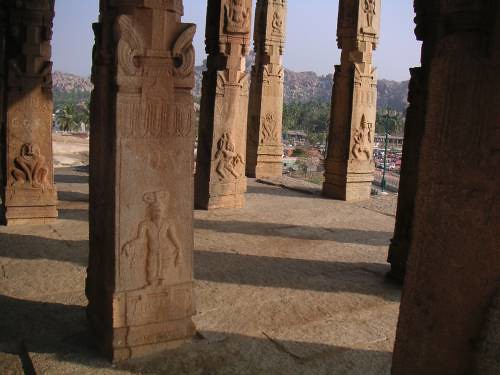
The sanctum houses a large – and now severely damaged – monolithic idol of the deity. The callousness, with which Ganesha’s trunk and belly had been destroyed, left on me an impression that still haunts me
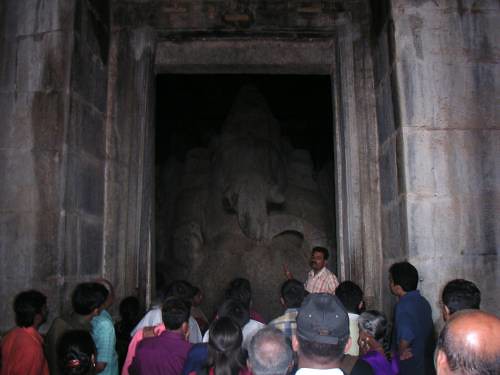
Also visible from here was the stunning light-yellow gopurum of the Virupaksha temple which looked somewhat out of place among the rusty/grey stone ruins
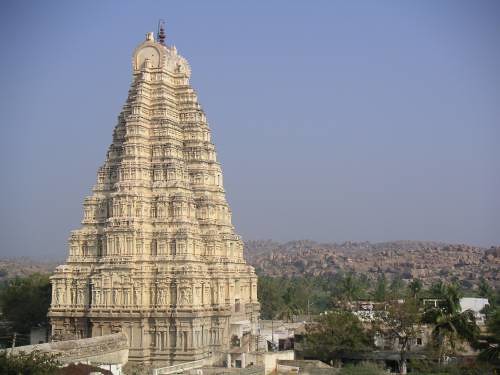
Prayers and other religious ceremonies are conducted here to date. We descended down the Kadlekalu temple and soon found ourselves at the portal of the Virupaksha temple. A closer inspection of the gopuram revealed that it was every bit from the same kernel (and time period) as the rest of the structures – the light yellow color was but result of zealous application of whitewash.
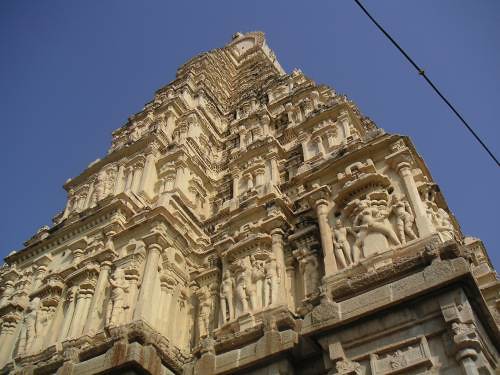
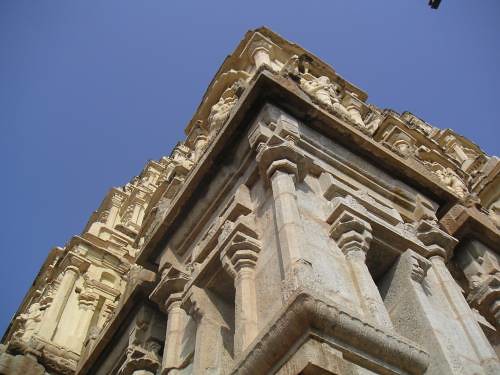
Another monkey was perched atop one such wall and was enjoying a coconut that it had probably pilfered from the temple. It drew considerable attention from tourists around me which it handled with candor of a newsreader reading his thousandth news bulletin.
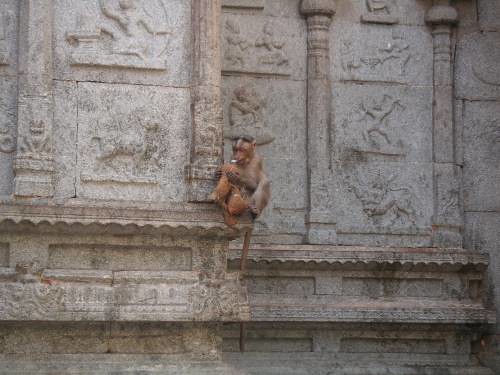
From there we moved to another imposing monolith – that of Narsimha, the lion-faced reincarnation of Vishnu, seated cross-legged on his serpent Adisesha. The statue has been restored extensively. A belt of stone that joins the two knees of the statue was apparently added recently for the statue’s structural stability. The painted iron gate tacked to the enclosure around the statue is unmistakably a 20th century addition.
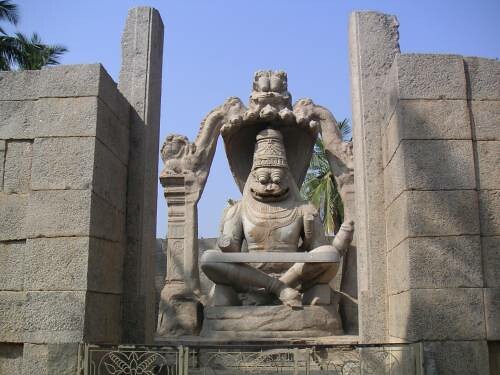
Our next stop was the zenana enclosures that are said to have housed the women of royal lineage. There were tall watchtowers in the compound with somewhat elaborate balconies that probably allowed the women a glimpse of the outside world.
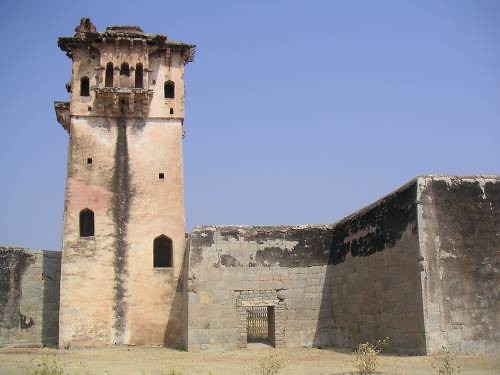
In one corner of the zenana was the intricate two story open pink structure called the Lotus Mahal. There were elaborately carved portals on each side of the structure that had something very Saracenic about them. It is not known what Lotus Mahal was used for – though for some unfounded reasons I could visualize a classical dance performance in the Mahal’s verandah on a late summer evening centuries ago. I fancy sitting here alone with a book on a rainy monsoon day.
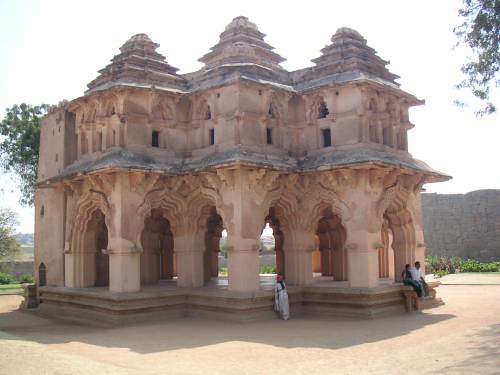

The sanctum houses a large – and now severely damaged – monolithic idol of the deity. The callousness, with which Ganesha’s trunk and belly had been destroyed, left on me an impression that still haunts me

Also visible from here was the stunning light-yellow gopurum of the Virupaksha temple which looked somewhat out of place among the rusty/grey stone ruins

Prayers and other religious ceremonies are conducted here to date. We descended down the Kadlekalu temple and soon found ourselves at the portal of the Virupaksha temple. A closer inspection of the gopuram revealed that it was every bit from the same kernel (and time period) as the rest of the structures – the light yellow color was but result of zealous application of whitewash.


Another monkey was perched atop one such wall and was enjoying a coconut that it had probably pilfered from the temple. It drew considerable attention from tourists around me which it handled with candor of a newsreader reading his thousandth news bulletin.

From there we moved to another imposing monolith – that of Narsimha, the lion-faced reincarnation of Vishnu, seated cross-legged on his serpent Adisesha. The statue has been restored extensively. A belt of stone that joins the two knees of the statue was apparently added recently for the statue’s structural stability. The painted iron gate tacked to the enclosure around the statue is unmistakably a 20th century addition.

Our next stop was the zenana enclosures that are said to have housed the women of royal lineage. There were tall watchtowers in the compound with somewhat elaborate balconies that probably allowed the women a glimpse of the outside world.

In one corner of the zenana was the intricate two story open pink structure called the Lotus Mahal. There were elaborately carved portals on each side of the structure that had something very Saracenic about them. It is not known what Lotus Mahal was used for – though for some unfounded reasons I could visualize a classical dance performance in the Mahal’s verandah on a late summer evening centuries ago. I fancy sitting here alone with a book on a rainy monsoon day.

4 Comments
Ok I hate you! ;-) (Just burning with envy right now...)
Great pic Deepak...am drooling and wondering when the stars will align and my plan to visit Hampi shall materialise...it's seeming like a 5 year plan now :-S
By G Shrivastava, at 3.4.05
Why does it have to be so complicated!? Just come to Bangalore and take a KSTDC weekend tour. Do what I did, act now, plan later :-)
By Deepak, at 3.4.05
Watt u find missing 8 or around narsimha idol, wanna full detail and description
By , at 14.4.05
Hi [Anonymous], I didn't find anything missing. If I am to go by pictures of years ago, the statue has been greatly restored.
You can check one yourself here; a cursory comparison with the picture that I've taken should make the alterations quite evident.
By Deepak, at 18.4.05
Post a Comment
| Archives | Blogroll |
|
May 2003 | June 2003 | July 2003 | August 2003 | September 2003 | October 2003 | November 2003 | December 2003 | January 2004 | February 2004 | March 2004 | April 2004 | May 2004 | June 2004 | July 2004 | August 2004 | September 2004 | October 2004 | November 2004 | December 2004 | January 2005 | February 2005 | March 2005 | April 2005 | May 2005 | June 2005 | July 2005 | August 2005 | September 2005 | October 2005 | November 2005 | December 2005 | January 2006 | February 2006 | March 2006 | Current Posts |
All material posted on this blog is copyrighted and may not be used in any form without the explicit permission of the author.

